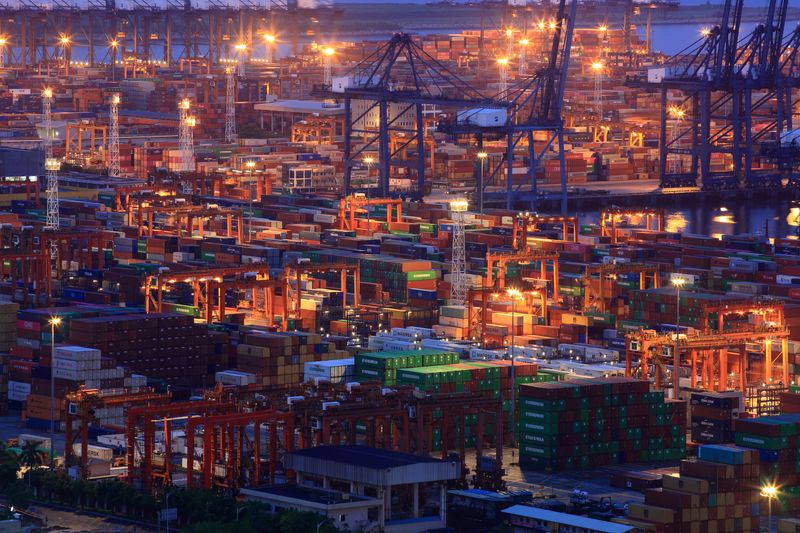BEIJING (Reuters) - The slump in China's exports is expected to have extended into March while a collapse in oil price likely deepened a decline in imports, a Reuters poll showed, as the coronavirus cripples the global economy and overall demand.
The pandemic's sweeping impact on businesses and consumers has triggered an unprecedented burst of stimulus from policymakers around the world in the past two months, but the widespread lockdowns in many economies is seen delaying a recovery in trade both in China and globally.
The grim trade report is likely to reinforce views that China's economy sharply contracted in the first quarter for the first time since at least 1992. Analysts are already forecasting a steep global recession this year as the virus has prompted worldwide restrictions on movement of people and goods.
Exports from the world's second-largest economy are expected to have fallen 14% in March from a year earlier, according to a median estimate from the survey of 31 economists, slowing the downturn somewhat from a 17.2% contraction in January-February period.
Imports, meanwhile, are set to have shrunk 9.5% from a year earlier, the sharpest drop since July 2016 and versus an 4.0% decline in January-February.
The World Trade Organization last week forecast that goods trade would shrink more steeply this year than in the global financial crisis a decade ago before rebounding in 2021 as the COVID-19 pandemic recedes.
Early in the outbreak, China imposed tough travel restrictions and factory suspensions to curb the spread of the coronavirus, squeezing labour supplies and sending exporters scrambling to fulfil orders.
But as the pandemic ravages the economies of China's trading partners, overseas orders have been scrapped, with many privately-owned exporters firing workers and warning about factory closures in not too distant future.
"Foreign demand from European and U.S. markets may have already significantly contracted in March," said UBS Economist Tao Wang, noting an official survey of factories released earlier this month showed export orders continued to fall in March.
"Despite some possible improvements in economic activity in March, first-quarter GDP growth is expected to contract by 10% from a year earlier," said Wang.
Investment bank Nomura and ANZ even raised the prospect of a recession in the world's second-biggest economy, forecasting second quarter GDP to dip below zero.
While China has managed to largely bring the virus under control, the country is facing rising risks of a second-wave infections from abroad, driven by a rise in infected travellers arriving from overseas.
As of April 12, China has reported a total of 82,160 coronavirus cases on the mainland, with 3,341 deaths. Worldwide, the pandemic has claimed over 113,000 lives and infected more than 1.8 million people.
A private survey, which focuses more on the export-oriented and small businesses, showed only minimal growth in factory activity in March. Export orders, in particular, remained persistently weak.
The Ministry of Commerce recently has repeatedly highlighted the difficulties confronting Chinese exporters, saying that firms across the board are facing a plunge in overseas orders and logistics logjam due to restrictions adopted by other countries to curb the spread of the virus.
Many forecasters expect China's 2020 growth could be nearer the 2.0% mark - the slowest in over 40 years - due to the sweeping impact of the pandemic both at home and overseas. The economy grew 6.1% last year.
Due to stuttering work resumptions and falling global demand, analysts expect nearly 30 million job losses this year in China outpacing the 20-plus million layoffs during the 2008-09 financial crisis.
